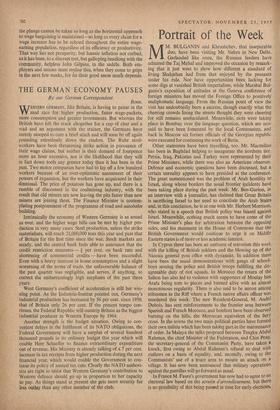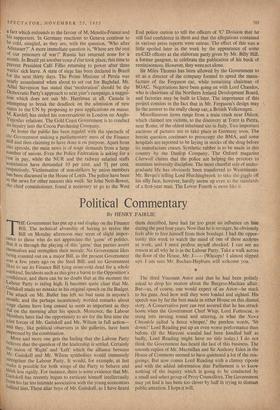Portrait of the Week
MM. BULGANIN and Khrushchev, that inseparable duo, have been visiting Mr. Nehru in New Delhi. Garlanded like oxen, the Russian leaders have admired the Taj Mahal and improved the occasion by remark- ing that it just went to show how different a standard of living Shahjehan had from that enjoyed by the peasants under his rule. Nor have opportunities been lacking for some digs at vanished British imperialism, while Marshal Bul- ganin's exposition of attitudes at the Geneva conference of foreign ministers has moved the Foreign Office to positively undiplomatic language. From the Russian point of view the visit has undoubtedly been a success, though exactly what the cheering crowds lining the streets thought they were cheering for still remains unelucidated. Meanwhile, riots were taking place in Bombay over the language question, which are now said to have been fomented by the local Communists, and back in Moscow six former officials of the Georgian republic were executed for continuing the work of Beria.
Other statesmen have been travelling, too. Mr. Macmillan has been in Baghdad helping to inaugurate the northern tier. Persia, Iraq, Pakistan and Turkey were represented by their Prime Ministers, while there was also an American observer. Defence and economic questions have been discussed, but a certain unreality appears to have presided at the conference. The great unmentioned was the problem of Arab hostility to Israel, along whose borders the usual frontier incidents have been taking place during the past week. Mr. Ben-Gurion, in an interview with a journalist, has claimed that Great Britain is sacrificing Israel to her need to conciliate the Arab States and, in this conclusion, he is at one with Mr. Herbert Morrison, who stated in a speech that British policy was biased against Israel. Meanwhile, nothing much seems to have come of the Prime Minister's plan for arbitration between the opposing sides, and his statement in the House of Commons that the British Government would continue to urge it on Middle Eastern states is of more or less academic interest.
In Cyprus there has been an outburst, of terrorism this week with the killing of British soldiers and the blowing up of the Nicosia general post office with dynamite. In addition there have been the usual demonstrations with gangs of school- boys stoning the police and British troops fulfilling the dis- agreeable duty of riot squads. In Morocco the return of the Sulton has also led to violence with supporters of Moulay ben Arafa being torn to pieces and burned alive with an almost monotonous regularity. There is also said to be unrest among tribesmen in the Riff where a French native affairs officer was murdered this week. The new Resident-General, M. Andre Dubois, has sent reinforcements to the frontier area between Spanish and French Morocco, and bonfires have been observed burning on the hills, the Moroccan equivalent of the fiery cross. In the towns the two main political parties have formed their own militia which has been taking part in the maintenance of order. In Malaya the talks proposed between Tengku Abdul Rahman, the chief Minister of the Federation, and Chin Peng, the secretary-general of the Communist Party, have taken a knock, first owing to Abdul Rahman's refusal to deal with outlaws on a basis of equality, and, secondly, owing to the Communists' use of a truce area to mount an attack on a village. It has now been announced that military operations against the guerillas will go forward as usual. In France M. Faure's government has now had to agree to an electoral law based on the scrutin d'arrondissement, but there is no possibility of this being passed in time for early elections, a fact which redounds to the favour of M. Mendes-France and his supporters. In Germany reactions to Geneva continue to be cold, mingled, as they are, with the question, 'Who after Adenauer?' A more immediate question is, 'Where are the rest Of our prisoners of war?' Russia has returned none for a month. In Brazil yet another coup d'etat took place, this time to prevent President Café Filho returning to power after three weeks' sick leave. A state of siege has been declared in Brazil for the next thirty days. The Prime Minister of Persia was nearly assassinated when about to set out for Baghdad. Mr. Adlai Stevenson has stated that 'moderation' should be the Democratic Party's approach to next year's campaign, a sugges- tion which does not suit Mr. Harriman at all. Canada is attempting to break the deadlock on the admission of new states to the UN by proposing to pass applications en masse. M. Kardelj has ended his conversations in London on Anglo- Yugoslav relations. The Gold Coast Government is to conduct an inquiry into the Cocoa Purchasing Company. At home the public has been regaled with the spectacle of the Government making a parliamentary mess of the Finance mill and then claiming to have done it on purpose. Apart from this episode, the main news is of wage demands from a large number of unions. Even the Police Federation is asking for a rise in pay, while the NUR and the railway salaried staffs association have demanded 10 per cent. and 71 per cent. respectively. Victimisation of non-strikers by union members has been discussed in the House of Lords. The police have been in the news for other reasons this week. Sir John Nott-Bower, the chief commissioner, found it necessary to go to the West End police station to tell the officers of 'C' Division that he still had confidence in them and that the allegations contained in various press reports were untrue. The effect of this was a little spoiled later in the week by the appearance of some ex-CID officers at the elaborate party given by Mr. Billy Hill, a former gangster, to celebrate the publication of his book of reminiscences. However, they were,not alone.
Sir Miles Thomas has been allowed by the Government to sit as a director of the company formed to speed the manu- facture of the Ferguson car, while remaining chairman of BOAC. Negotiations have been going on with Lord Chandos, who is chairman of the Northern Ireland Development Board, and factories may be built in Ulster. The importance of, this project consists in the fact that in Mr. Ferguson's design may lie the answer to the really cheap car, a British Volkswagen.
Miscellaneous items range from a train crash near Didcot, which claimed ten victims, to the discovery at Torre in Pietra. near Rome, of the oldest inhabited site in Italy. Two important auctions of pictures are to take place in Germany soon. The heroin question continues to preoccupy the BMA, and some hospitals are reported to be laying in stocks of the drug before its manufacture ceases. Synthetic rubber is to be made in this country by the Dunlop Company. The Oxford magazine Cherwell claims that the police are helping the proctors to maintain university discipline. The more cheerful side of under- graduate life has obviously been transferred to Westminster. Mr. Bevan's telling Lord Hinchingbrook to take the giggle off his silly 'ace, however, hardly seems up even to the standard', of a first-year man. The Lower Fourth is more like it.



























































 Previous page
Previous page